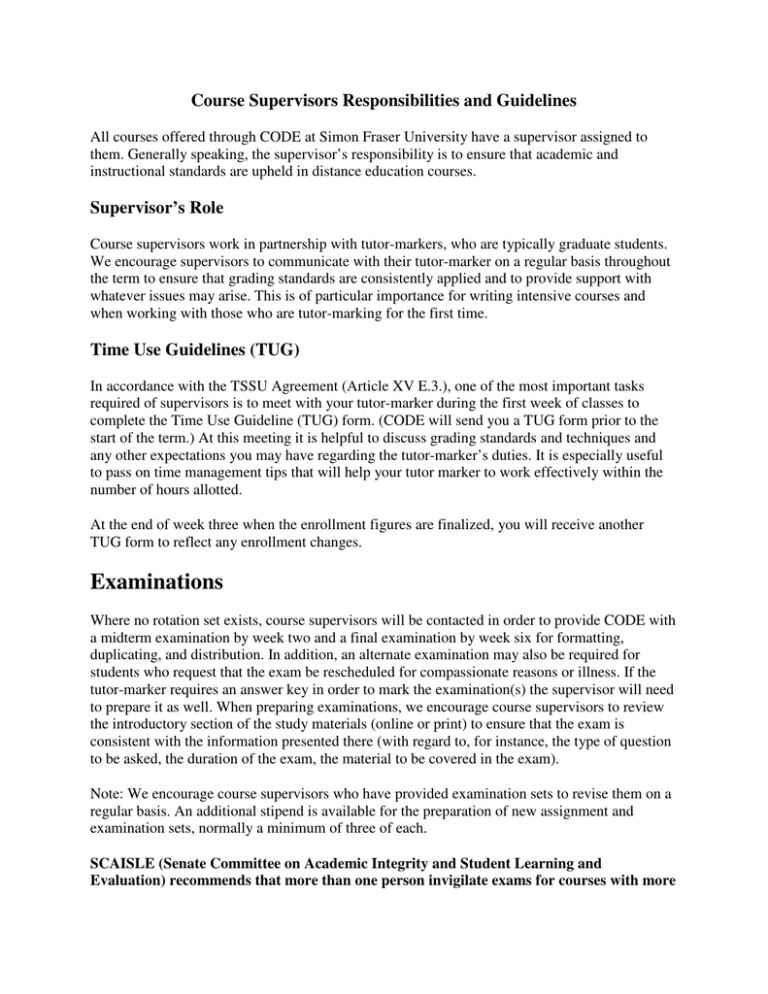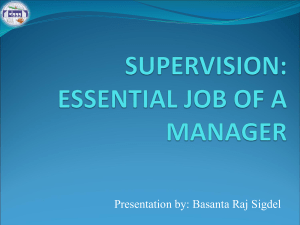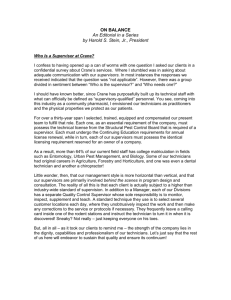Course Supervisors Responsibilities and Guidelines
advertisement

Course Supervisors Responsibilities and Guidelines All courses offered through CODE at Simon Fraser University have a supervisor assigned to them. Generally speaking, the supervisor’s responsibility is to ensure that academic and instructional standards are upheld in distance education courses. Supervisor’s Role Course supervisors work in partnership with tutor-markers, who are typically graduate students. We encourage supervisors to communicate with their tutor-marker on a regular basis throughout the term to ensure that grading standards are consistently applied and to provide support with whatever issues may arise. This is of particular importance for writing intensive courses and when working with those who are tutor-marking for the first time. Time Use Guidelines (TUG) In accordance with the TSSU Agreement (Article XV E.3.), one of the most important tasks required of supervisors is to meet with your tutor-marker during the first week of classes to complete the Time Use Guideline (TUG) form. (CODE will send you a TUG form prior to the start of the term.) At this meeting it is helpful to discuss grading standards and techniques and any other expectations you may have regarding the tutor-marker’s duties. It is especially useful to pass on time management tips that will help your tutor marker to work effectively within the number of hours allotted. At the end of week three when the enrollment figures are finalized, you will receive another TUG form to reflect any enrollment changes. Examinations Where no rotation set exists, course supervisors will be contacted in order to provide CODE with a midterm examination by week two and a final examination by week six for formatting, duplicating, and distribution. In addition, an alternate examination may also be required for students who request that the exam be rescheduled for compassionate reasons or illness. If the tutor-marker requires an answer key in order to mark the examination(s) the supervisor will need to prepare it as well. When preparing examinations, we encourage course supervisors to review the introductory section of the study materials (online or print) to ensure that the exam is consistent with the information presented there (with regard to, for instance, the type of question to be asked, the duration of the exam, the material to be covered in the exam). Note: We encourage course supervisors who have provided examination sets to revise them on a regular basis. An additional stipend is available for the preparation of new assignment and examination sets, normally a minimum of three of each. SCAISLE (Senate Committee on Academic Integrity and Student Learning and Evaluation) recommends that more than one person invigilate exams for courses with more than 25 students. Therefore, CODE and your academic department strongly encourage you to attend the exam(s) with your tutor-marker. Some departments now require this of the course supervisor. Extensions On occasion students seek the course supervisor’s permission to extend an assignment due date or to reschedule the writing of the final exam. Please note that if the tutor-marker is not willing or available to mark an assignment or exam after the end of their contract, you would normally be responsible for the marking. Should a student take an exam rescheduling request to you directly, please keep our Student Services Facilitator’s informed by e-mail (codehelp@sfu.ca) or telephone our CODE General Office (778.782.3524) and ask to speak to the Student Service Facilitator for your course so that we can make the appropriate arrangements. Final Grades Two kinds of students may be enrolled in the course you supervise: 1. SFU students: Grades submitted to your Department Chair. 2. Students through Thompson Rivers University, Open Learning (TRU-OL): Grade sheets are returned to CODE upon completion and CODE forwards them to TRU-OL. Course and TM Evaluations CODE provides the course and TM evaluations to each academic unit at the end of the term. Academic units then distribute this information according to departmental practice. Revising Course Materials for Future Course Offerings Please keep the Program Director here at CODE informed of any needed corrections, revisions, or updating of materials. Prior to undertaking any such changes, contact the Program Director about the approval process and timelines. Revising Assignments for Future Course Offerings In order to ensure the integrity of the grading process, it is important that assignments be changed regularly. If there is no assignment rotation set on file or the same assignments have been used several times you may be asked to prepare new assignments for the next offering. As noted previously, a separate stipend is available for preparing a new rotation set of assignments as well as exams if requested of you.






